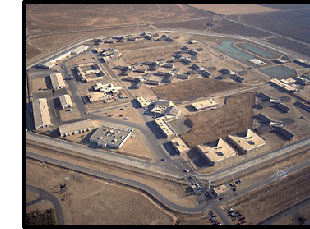|
The deaths of eight female inmates within a seven-week period at
a California women's prison have sparked a new round of inquiry
into the controversy over adequate medical care in the state's prison
system. Among the deceased was Pamela Coffey, 46, who died on December
2. Her cellmates say that correctional officers mocked her pleas
for assistance a half-hour before her death.
Though no foul play is suspected in the deaths of the inmates at
Central California Women's Facility (CCWF), the concentration of
these deaths in November and December resulted in renewed insistence
by several Bay Area prisoner advocacy groups that the California
Department of Corrections (CDC) must reform its health care system.
Three of the deaths were considered sudden and unexpected, says
CDC spokeswoman
 |
|
Central California Women's
Facility in Chowchilla
CALIFORNIA DEPT. OF CORRECTIONS
|
Terry Thornton, while the remaining five women were terminally ill.
Thornton also stresses that CCWF experiences higher annual death rates
than other women's state prisons because inmates requiring more intensive
medical attention are transferred there from other facilities.
But all of the eight recent deaths cry out for closer examination,
according to Cynthia Chandler, an attorney and co-director of the
Oakland-based Justice Network on Women, a nonprofit law center that
provides women prisoners with legal services. Justice NOW represents
many female inmates seeking compassionate release, which is an official
recall of sentence recommended by the prison and granted by a judge
for terminally ill prisoners.
Compassionate release became law in California in 1997. Prisoners,
usually with the help of a lawyer, seek a compassionate release
recommendation from a prison doctor. The prison warden takes the
recommendation to the CDC director, who in turn must give it to
a judge for final approval. The release can be turned down at any
point in the process. Once the sentence is recalled, the prisoner
is released to family or a medical facility.
Over the past several years, human rights groups have criticized
both the CCWF and other California women's prisons for substandard
medical care (see "Bad Medicine," January 8). A 1995 class action
lawsuit, Shumate v. Wilson, accused prison administrators
and medical staff at CCWF and Chino's California Institute for Women
of cruel and unusual punishment and "deliberate indifference" to
the health needs of inmates. In 1997, the state agreed to institute
significant changes in the health care system and to submit to court-ordered
monitoring. In August, the lawsuit was dismissed with the agreement
of all parties involved.
Following the recent deaths, the CDC launched its own internal
investigation in addition to hiring a team of University of California-Davis
doctors to examine medical records. "There are several investigations
looking at medical and custody issues in the events preceding the
deaths," Thornton says. "We are just as anxious as everyone else
to get answers. If there is any evidence of staff misconduct, those
will be dealt with appropriately."
But activist groups--including Justice NOW and California Prison
Focus--have demanded a completely independent investigation. State
Sen. Richard G. Polanco (D-Los Angeles), chairman of the joint legislative
committee on prison construction and operations, arranged a special
hearing on January 17 in Sacramento. The hearing was dominated by
prison officials' testimony, and family members of the deceased
were allowed to comment for just over an hour.

|





